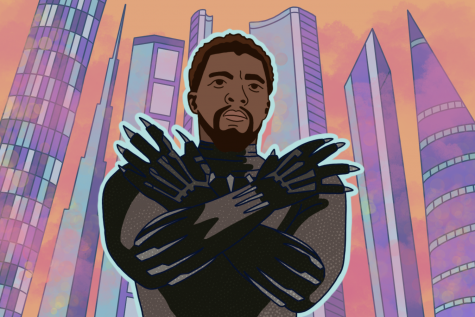Opinion: Why Black Panther empowered me as a Black writer
September 11, 2020

The night “Black Panther” was released, I waited in what seemed like an endless line of people, winding around the lobby of the AMC Champaign 13 theatre.
My then boyfriend and I, knowing the showtimes would sell out, bought our tickets weeks in advance. We went to the showing dressed as Storm from X-men and T’Challa from “Black Panther.”
“Black Panther” was released in 2018 when I was an undergraduate creative writing student and made $25.2 million in its first night, according to the New York Daily News.
During this time, I was not as focused on the genres I write about today—Afro Sci-Fi and Afrofuturism—and I had a Black teacher who questioned why I instead chose to write about people who didn’t reflect my culture.
She encouraged me to draw experiences from my own life and write about people of color and the complexities I found in my own identity growing up in a Black middle class family in a white suburb.
In previous courses I attempted writing about Black characters with different layers to their personas, but I noticed my stories often received less attention than those written by white classmates during writing workshops.
“Black Panther” affirmed that I had the ability and purpose to portray Black people in fantastical worlds. The film became a cultural touchstone and the overwhelming praise it received showed me there is an audience for my work, despite what my experiences in workshops showed me.
I now write stories that are Black Sci-Fi, Afrofuturism and Black magical realism. The worlds I create are fantastical, but the characters themselves face ordinary internal conflicts. They often have to navigate their identifies in the societies they belong to and have obstacles to overcome before achieving their dreams.
Storm, a character from X-Men, has been my favorite superhero since I was a child not only because she is Black and looks like me, but her powerful abilities helped African nations facing droughts and natural disasters. This was a Black woman helping African nations, rather than a white savior.
Chadwick Boseman, who passed away Aug. 28 due to a four year battle with colon cancer, gave power to the film “Black Panther” and the mythical country of Wakanda because his character, T’challa, was the embodiment of a just, merciful and wise leader of a prosperous African nation.
Boseman’s portrayal of the character is reminiscent of the characters I depict in my own work.
T’challa struggles with the pressures of being a ruler and the internal battles of who he is as a king. Often when Black men are depicted as being in a role of authority, they are shown as a domineering, corrupt or villainous. But Boseman as T’Challa juxtaposed this stereotype.
Storm and T’Challa affirmed my heritage as a Black kid living in a predominantly white suburb. When I read about Wakanda, where my favorite superheroes had their wedding, I am immediately drawn in. But the two dimensional comics didn’t make it an immersive experience like the movie did, as there is no soundtrack or actors, only small comic strips.
Learning about these Black superheroes gave me a different perspective in understanding the narrative of my culture, while many of my classmates already had this affirmation over the years through white Disney princesses or white child actors.
I saw the film a total of three times during the month of its release. Each time I saw people in the audience wearing dashikis, kente cloth or other African garments to pay homage to the film’s cultural significance.
Wakanda is a shining beacon of Black excellence and the film made it all seem so real, from the footage of beautiful terrains, to the soundtrack, to the encrypted alphabetic characters for the Wakandan language.
“Black Panther” is more than an enamoring land of fantasy, it is the connective roots of our generation. The film sparked an interest in reconnecting with Black heritage and wearing it with pride.
As a writer and filmmaker, it is my goal to see the worlds I create on the big screen impact others like “Black Panther” has done for me, which is now more in reach.
I feel empowered to present worlds where Black characters aren’t monolithic and the plots aren’t cliche depictions of one-dimensional BIPOC characters. I will always be grateful the creators of Black Panther made fantasy a genre for BIPOCs too.
Black films don’t always have to be about struggles or ill-gotten wealth. The death of Boseman saddened me, but it reaffirmed he will always be the Black Panther who broke systemic barriers for me.







